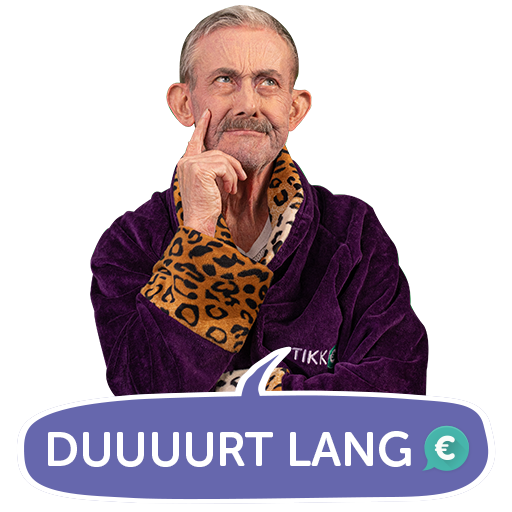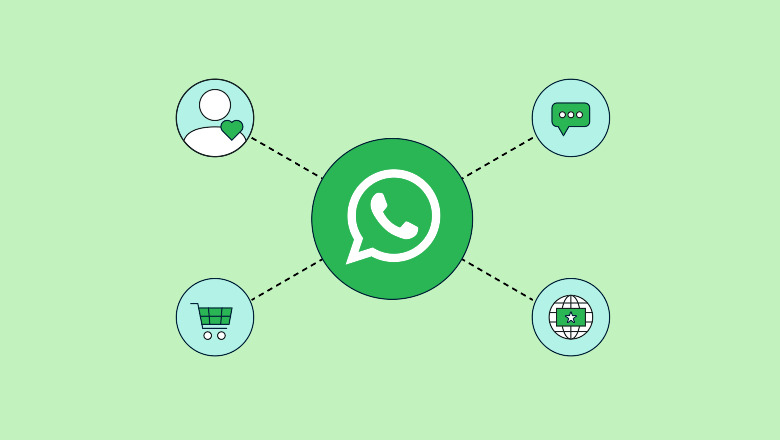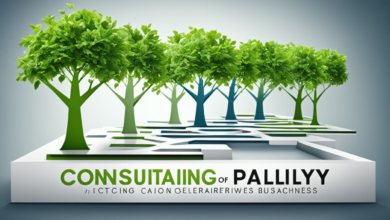16 unexpected ways to use WhatsApp for Business
Conversational marketing is on the rise, driven primarily by increasing consumer expectations for convenience and tailored digital experiences. In fact, 90% of global consumers say they will spend more With companies that personalize the service they offer.
With the recent government as well as self-imposed restrictions on in-person shopping, more brands than ever are turning to WhatsApp and similar messaging platforms to interact with customers in a meaningful way.
Today, there are more than 5 million brands active on WhatsApp Business. It’s a huge market, ready for engagement. In this article, we’ll establish the growing importance of WhatsApp in all business functions (not just marketing), demonstrate some of the ways brands use the app, and highlight some innovative tips to get the most out of the network.
Benefits of Using WhatsApp for Business
For brands using WhatsApp to connect with customers, there are several obvious benefits.
- Expand your global reach. WhatsApp, the most popular messaging app worldwide, has over two billion active users in over 180 countries. With such a large potential audience, it’s easy to connect with new prospects who might not yet know what your business has to offer.
- Improve customer experience. Research from Zendesk found that leading companies provide customer support on twice as many channels as their peers. If you want to expand your opportunities to support customers, WhatsApp provides a seamless platform to do so.
- Increase employee satisfaction. WhatsApp’s messaging capability can also be a win-win for your internal team as customer support personnel report that they are 50% more likely to engage with customers via messaging platforms versus more traditional methods because it gives them the freedom to multitask. gives.
- Increase profitability. When customer service is streamlined, operating expenses are often reduced. Gartner predicts that by 2025, 40% of customer service will go from a key organizational spend to a significant profit driver as direct messaging streamlines sales pipelines.
16 brands that demonstrate how to use WhatsApp for business efficiently
Brands are using WhatsApp in various ways that expand their customer-facing and internal capabilities. The following examples highlight use cases in customer service, financial services, marketing, human resources and pipeline development.
customer service
1. German telecommunications company, Vodafone has adopted WhatsApp for customer messaging, reaching over 200,000 customers every month through this channel. Their artificial intelligence (AI) chatbot, TOBi, recognizes the needs of over 250 customers and will only pass requests on to employees if it encounters a problem it isn’t equipped to solve. More than half of these interactions result in a solution for the customer, eliminating the need for live customer service support in many cases.

2. Estee Lauder was the first major beauty brand to use WhatsApp to provide personalized skin care consultations for customers. Liv, an AI chatbot, was developed in 2020 at the height of the COVID-19 pandemic to replace over-the-counter consultations previously held by customers in department stores. These digital conversations help customers understand how to use the company’s products and collect tips for maintaining an effective skin care regimen.

3. Nissan Saudi Arabia, looking to connect younger customers and reduce its reliance on call centers, began using WhatsApp to handle inquiries and boost sales. In the Kingdom of Saudi Arabia, people under the age of 30 make up about three-quarters of the population. To reach that market, Nissan developed an automated chatbot powered by WhatsApp that could answer simple customer queries without needing to move to a call center. After the launch of the chatbot, leads increased by 390% and inbound calls decreased by 33%.

financial Services
4. Mutua Madrileña, one of Spain’s leading insurance providers, offers personalized messaging to customers via WhatsApp on over 1,000 topics. In the first six months of using this new channel for customer support, the company had received nearly half a million messages, accounting for 23% of digital customer inquiries. In late 2020, the brand became the first insurer in the country to allow customers to submit automobile accident claims through its WhatsApp virtual assistant, a process that has resulted in a process now up to 30% faster.

5. WhatsApp banking is also a thing now. Many banks, mainly in Europe, the Middle East and Asia, are using the app to make banking simpler and more convenient for customers. Both ICICI Bank of India and HBL Bank of Pakistan use the app to answer customer questions and perform basic transactions.

6. One of the largest money transfer providers in Africa, Mukuru realized over $1 million in reduced SMS costs after implementing customer service via WhatsApp. It has improved the reliability and security of wire transfers for financially excluded communities across the continent. With WhatsApp available, consumers can reduce their reliance on mobile banking apps that traditionally use the more unpredictable Unstructured Supplemental Service Data (USSD) protocol that does not require an Internet connection. Since the launch of WhatsApp, the customer satisfaction of the brand has increased from 65% to 80%.
7. Tikki, a Dutch peer-to-peer payment app (similar to Venmo or Zelle), created its own set of 11 stickers for its WhatsApp users. Stickers gave customers a fun way to communicate with each other by thanking someone for paying or reminding them to do so.

marketing campaign
8. Absolute Vodka, a Swedish spirits brand, used WhatsApp to promote an in-person product launch event in Argentina. Customers were encouraged to try to convince “her” a chatbot doorman named Sven that they were entitled to one of the two available tickets. The campaign resulted in the receipt of over 1,000 messages from 600 individuals in three days.
9. Carrefour Group, a French-based big box store chain, uses WhatsApp to provide a digital coupon catalogue to its client base. These offers were printed first, but the company wanted to offset those costs and have better targeting capabilities based on customers’ locations and preferences. By entering their zip code into the chatbot, customers can be directed to the nearest store and get tailored deals right on their phone. According to Meta, 45% of users now connect to digital catalogs, while 10% of users open catalogs via email.

10. The Brazilian branch of Hellmans, a mayonnaise brand, launched a campaign via WhatsApp to provide its users with on-demand cooking advice given by culinary professionals. The campaign, called Whatscook, allowed customers to interact with chefs in real time to receive detailed instructions, answers to their questions, or specific assistance with preparing their meals.

1 1 Adidas’ 100% Unfair Predator campaign, launched via WhatsApp, helped the brand connect with a core set of customers: footballers. Users were allowed to chat with Adidas to request a professional athlete to join their local teams for a singles game. For the lucky teams selected, players sponsored by Adidas appeared in the company’s new Predator20 Mutator shoes.

human resource
12. German chemical production company BASF Group uses WhatsApp to enlist potential recruits. Anilina, a digital career assistant in the form of a chatbot, helps answer candidates’ queries quickly and on the spot. For a more involved interaction, candidates can reach out to the representatives via WhatsApp chat from Monday to Friday.

13. Logistics company Deutsche Post DHL Group allows candidates to apply to open positions directly from WhatsApp, eliminating the need to fill out long and cumbersome online forms. The company deployed the chatbot to reach its target candidates where they are through a more user-centric application process.
pipeline development
14. French newspaper Le Monde used WhatsApp’s status feature to target customers in French-speaking African countries. The company posts content on its status, which can be viewed three to four times a day for 24 hours (similar to an Instagram story). About 20% of the brand’s followers typically consume this content, and over time, Le Monde Afrique has grown its WhatsApp followers to 10,000.
15. Brazilian beachwear brand Trai uses WhatsApp to interact with its customers and send order information such as receipts and tracking information. After doubling its presence on the app, the company 5Xed its annual sales.
16. Centaline Property, one of Hong Kong’s largest real estate brokerages, uses WhatsApp to more quickly qualify leads and grow its sales pipeline. The company also integrated the network with its property recommendation engine to allow each client’s information and communication history as well as lead to the appropriate agent. The use of key features of WhatsApp such as list message and reply button helps Centreline properties to personalize their outreach, resulting in a 27% increase in sales conversions.

New ways to use WhatsApp for Business
WhatsApp is not just a place to answer one-time questions from customers. Inspired by the above brands, consider these ideas for integrating WhatsApp into your social media, sales or customer service strategies.
- Optimize your profile. Use your WhatsApp Business Profile to share important information about your brand and provide answers to common customer questions.
- Use a digital catalogue. Create a digital catalog to help your customers find your products or services.
- support customers. You can significantly reduce your reliance on call centers by outsourcing simple customer requests and queries to a WhatsApp-powered chatbot or digital assistant.
- Share content via Status feature. Use the Status feature to share content the same way you would your Facebook or Instagram stories.
- Develop creative marketing campaigns. Engage customers with an out-of-the-box marketing campaign.
- Replicate core business processes. Identify key areas of your business that might be possible to replicate on WhatsApp.
- Level up with ads. Use Facebook and Instagram ads that click WhatsApp to start customer conversations that lead to sales.
-
-
Conversational marketing is here to stay. Most customers expect this, and companies that strategically engage their audiences through channels like WhatsApp are in a better position to take advantage of the growth that makes this possible.
If you’re looking for even more opportunities to use social messaging to build stronger customer relationships, this interview with Martha O’Burn-O’Reilly, Head of Messaging Developer Partnerships at Meta, should give you some ideas.
16 Unexpected Ways to Use WhatsApp for Business The post first appeared on Sprout Social.






